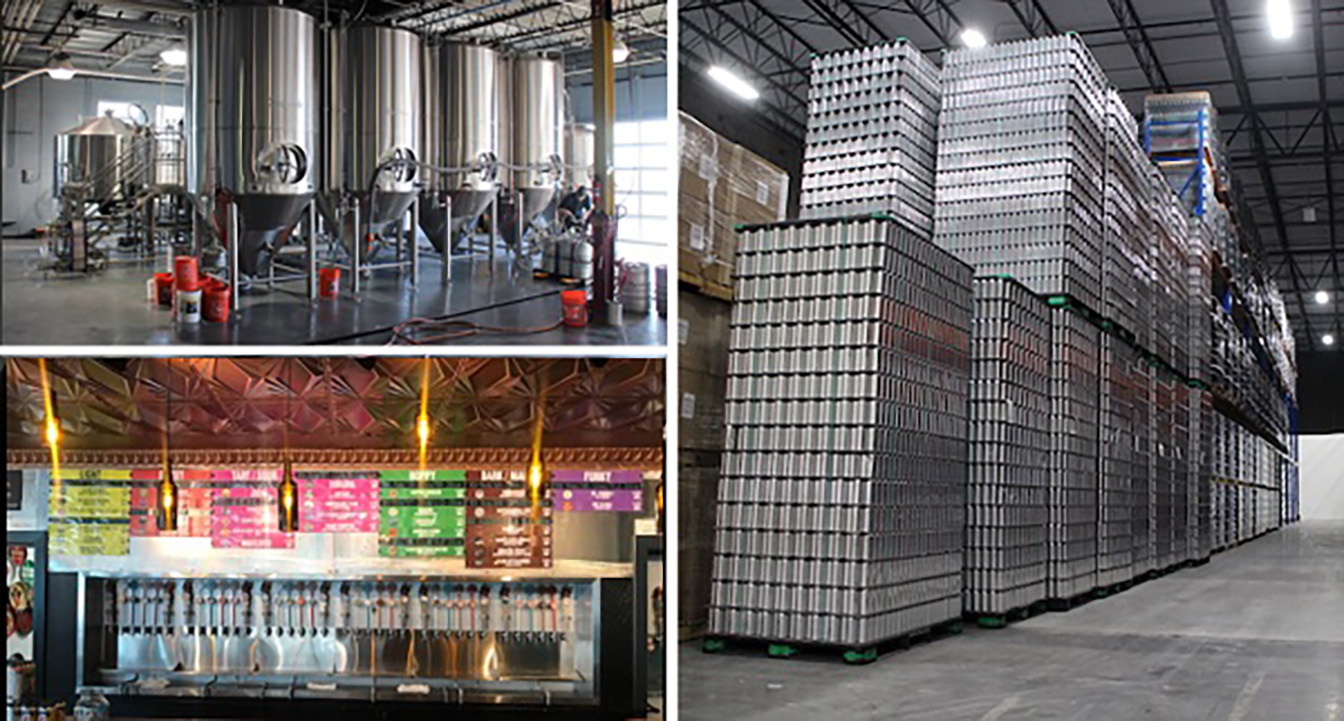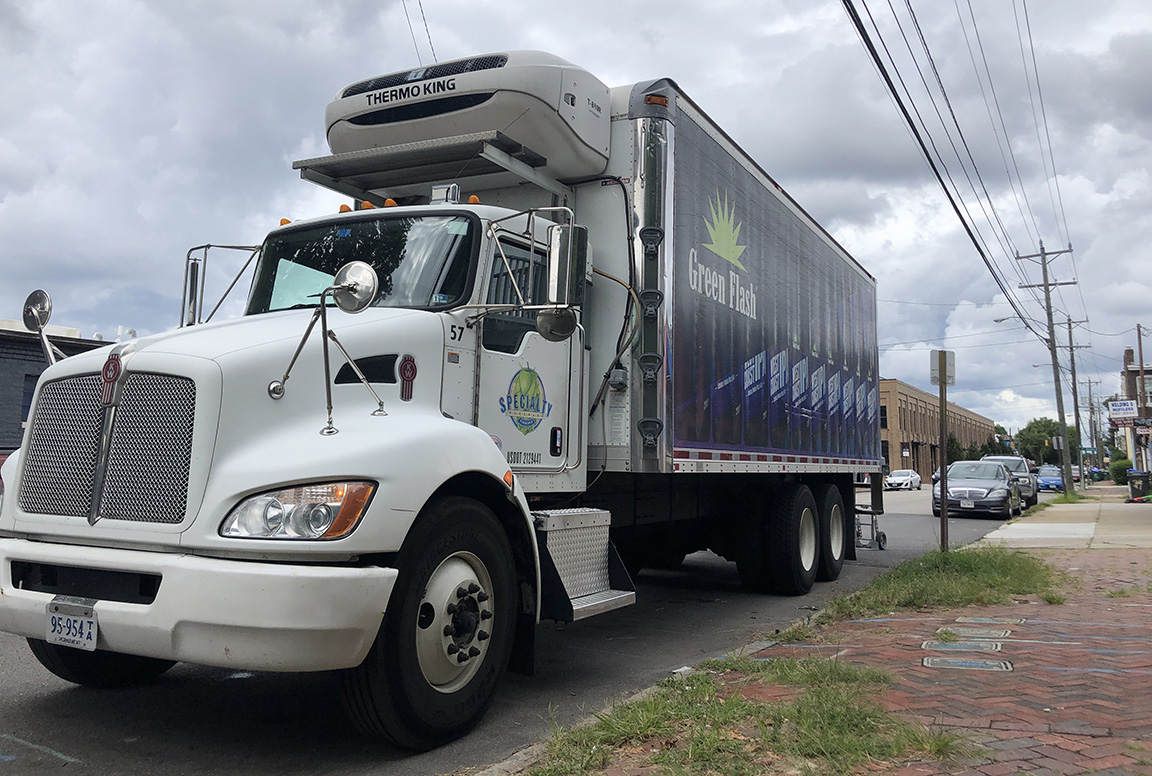
A substantial change to Virginia beer law is being proposed for next year’s General Assembly session. (BizSense file photos)
Owners and staff of Virginia’s breweries were generous with their cheering last week at the Virginia Craft Beer Cup, put on by the Virginia Craft Brewers Guild.
While beer makers got plenty of love, the most thunderous ovation at the annual awards ceremony was reserved for VCBG President and CEO Brett Vassey, when he announced that the guild plans to lobby during the upcoming General Assembly session for breweries to have the right to self-distribute their products.
Currently, to get their beers to restaurants and bottle shops, breweries of all sizes in Virginia must sell their beer to a distributor, which then sells it to those retailers. The arrangement is known as “the three-tier system” and is codified in state law.
The VCBG is looking to change the law so that breweries can sell their beer directly to retailers, with mainly smaller and newer breweries in mind.
“For small brewers, this is a really, really big deal,” Vassey said in an interview with BizSense.
While the change might not be as significant as Senate Bill 604 — the 2012 legislation that helped springboard the state’s craft beer boom by making it legal for breweries to sell their product for on-site consumption — Vassey said self-distribution would be the biggest change the industry has seen in the decade-plus since.
“There aren’t too many grand solutions as big as SB 604 was. But this is part of a package of what I call ‘silver buckshot,’” he said.
Since distributors are currently the ones selling beer to retailers, craft breweries often find themselves in proxy battles with both craft and corporate breweries for precious space on restaurant taps and store shelves. Self-distribution would give breweries more autonomy in how they sell and promote their beer themselves via off-premises sales.
Jason Miller co-owns Crazy Rooster Brewing Co., a 2-year-old brewery in Powhatan that was one of the many Richmond-area spots to take home a medal last week. He said the change to self-distribution would undoubtedly be a huge deal for him and his 5,000-square-foot, 10-barrel brewery.
“For a small brewery like us, it is a challenge to get your foot in the distribution network. We’ve been fortunate, (but) it’s been a challenge to get our beers out on the market,” Miller said. “There’s not really much more that we can do other than ask and hope. We’ve knocked on a lot of doors, inquiring about getting our beers on tap.”
In lieu of trying to break the three-tier system, an idea Vassey said was “basically politically impossible,” the guild is looking to allow self-distribution by creating the Virginia Beer Distribution Co., which would operate as a division of the state’s Department of Agriculture and Consumer Services. It would be through the VBDC that craft brewers could sell their product directly to retailers.
Vassey said the guild plans to follow in the footsteps of Virginia’s wine industry, which successfully lobbied to create the Virginia Wine Distribution Co. in 2007. The VWDC also is a division of the Department of Agriculture and Consumer Services.
“As an industry we’re not big fans of reinventing the wheel. We’re creating a mirror image of the VWDC,” Vassey said. “They had a very similar need and market situation to us.”
With its brews getting shipped all over the state, Bingo Beer Co. has one of the larger distribution footprints among Richmond-area breweries, so the change wouldn’t likely affect the Scott’s Addition brewery. However, co-owner Jay Bayer described the idea of self-distribution as fantastic for the industry.
“What seems like is so often the case is the beer side’s like, ‘Hey we noticed that wine is able do this thing, why is it that beer can’t do this thing?’” Bayer said regarding the planned legislative push.
“Through that we end up finding ways for more competitiveness in the market, for opportunities for more creativity, for consumer choice, for so many things that are beneficial for the consumer.”
The effort began at this year’s General Assembly session with a bill from Del. Roxann Robinson (R-Chesterfield) that successfully created a work group to study self-distribution for Virginia breweries, one that both the VCBG and Virginia Beer Wholesalers Association participated in.
VBWA President and CEO Phil Boykin said in a statement that the association supported the study and has enjoyed working on it. Boykin praised the wine industry’s self-distribution program and said the study will determine whether a similar program can work for beer.
Vassey said there are still details to be ironed out, including how many barrels of beer a brewery could self-distribute, but Vassey that the group is confident they’ll be able to negotiate the terms with VDACS and the VBWA.
Another outstanding detail would be how the VBDC would affect existing distribution agreements, which are typically very difficult to break. A legal spat regarding the perpetuity of a distribution deal saw Bell’s Brewery pull its beer from Virginia shelves for a few years before returning in 2020.
“(The VBDC) will not affect those distribution agreements, but it’s one of those sticky details we have to work out with beer wholesalers in the state at all levels,” Vassey said. Bayer also said he thinks the success of the effort will come down to the barrelage allowed to be self-distributed.
After years of collecting data from its members, Vassey said the guild noticed that Virginia breweries’ wants relating to self-distribution weren’t complicated.
“Those that wanted self-distribution most, when we really got down to brass tacks, all they wanted to do is to deliver primarily draft beer to less than 20 retail accounts near their brewery,” Vassey said.

A Specialty Beverage of Virginia truck with beer to unload this week. Specialty represents local breweries Bingo Beer Co. and Ardent Craft Ales. (Mike Platania photo)
“It wasn’t what you’d consider a traditional distribution model where you sign over your distribution rights to a specific market forever, and the distributor invests in and builds your brand. That’s not what (VCBG members) wanted. They just wanted to deliver small amounts to a handful of retail accounts.”
The involved parties are planning to negotiate the remaining details this fall, and Vassey said a couple of representatives in both the state’s Senate and House of Delegates are interested in sponsoring the bill. The General Assembly convenes next year on Jan. 11.
“Two and a half years ago we wouldn’t have even introduced a bill to draw all of us together to negotiate. It just wasn’t viable,” Vassey said. “So, we feel pretty good about our chances of getting everybody to get consensus, or at least getting consensus to 90 percent, which sometimes with legislation, that’s what you have to do. You can’t let perfect be the enemy of good.”
With the study still ongoing and negotiations pending, at least one Virginia beer distributor likes the idea of self-distribution for breweries.
Aaron Childers owns Pretty Ugly Distribution, a Chesapeake-based firm with about 30 clients, including locals like Isley Brewing Co. and Dancing Kilt Brewery.
Pretty Ugly was formed as a so-called arms-length distributor since Childer’s husband co-owns Big Ugly Brewing, which is also in Chesapeake. While brewery owners aren’t allowed to own distribution companies under Virginia law, their family members can.
Childers echoed Miller, Vassey and Bayer’s sentiment that self-distribution makes sense primarily for small brewers. She said self-distribution could even work as a stepping-stone toward signing with companies like hers.
“I think it gives (breweries) a lot of flexibility as far as not having to sign a contract, not having to feel pressured to make that decision before they’re really ready,” Childers said.
“It offers a nice segue into potentially a larger distribution relationship. For some folks, once they’re at a point where they’re ready to distribute to grocery stores or put out some real volume, they may not want to invest in the infrastructure to support all that.”
Miller, meanwhile, is hoping to be able to someday load up his car with Crazy Rooster’s beer and distribute it himself.
“I will absolutely travel myself. If I can haul it, man, I’ll make the drive to some further away locations around the state, absolutely,” Miller said, laughing. “It has the potential to open up a lot of doors for us. It’s a fantastic opportunity, not only for us, but also many of the 300-plus breweries around the state.”

A substantial change to Virginia beer law is being proposed for next year’s General Assembly session. (BizSense file photos)
Owners and staff of Virginia’s breweries were generous with their cheering last week at the Virginia Craft Beer Cup, put on by the Virginia Craft Brewers Guild.
While beer makers got plenty of love, the most thunderous ovation at the annual awards ceremony was reserved for VCBG President and CEO Brett Vassey, when he announced that the guild plans to lobby during the upcoming General Assembly session for breweries to have the right to self-distribute their products.
Currently, to get their beers to restaurants and bottle shops, breweries of all sizes in Virginia must sell their beer to a distributor, which then sells it to those retailers. The arrangement is known as “the three-tier system” and is codified in state law.
The VCBG is looking to change the law so that breweries can sell their beer directly to retailers, with mainly smaller and newer breweries in mind.
“For small brewers, this is a really, really big deal,” Vassey said in an interview with BizSense.
While the change might not be as significant as Senate Bill 604 — the 2012 legislation that helped springboard the state’s craft beer boom by making it legal for breweries to sell their product for on-site consumption — Vassey said self-distribution would be the biggest change the industry has seen in the decade-plus since.
“There aren’t too many grand solutions as big as SB 604 was. But this is part of a package of what I call ‘silver buckshot,’” he said.
Since distributors are currently the ones selling beer to retailers, craft breweries often find themselves in proxy battles with both craft and corporate breweries for precious space on restaurant taps and store shelves. Self-distribution would give breweries more autonomy in how they sell and promote their beer themselves via off-premises sales.
Jason Miller co-owns Crazy Rooster Brewing Co., a 2-year-old brewery in Powhatan that was one of the many Richmond-area spots to take home a medal last week. He said the change to self-distribution would undoubtedly be a huge deal for him and his 5,000-square-foot, 10-barrel brewery.
“For a small brewery like us, it is a challenge to get your foot in the distribution network. We’ve been fortunate, (but) it’s been a challenge to get our beers out on the market,” Miller said. “There’s not really much more that we can do other than ask and hope. We’ve knocked on a lot of doors, inquiring about getting our beers on tap.”
In lieu of trying to break the three-tier system, an idea Vassey said was “basically politically impossible,” the guild is looking to allow self-distribution by creating the Virginia Beer Distribution Co., which would operate as a division of the state’s Department of Agriculture and Consumer Services. It would be through the VBDC that craft brewers could sell their product directly to retailers.
Vassey said the guild plans to follow in the footsteps of Virginia’s wine industry, which successfully lobbied to create the Virginia Wine Distribution Co. in 2007. The VWDC also is a division of the Department of Agriculture and Consumer Services.
“As an industry we’re not big fans of reinventing the wheel. We’re creating a mirror image of the VWDC,” Vassey said. “They had a very similar need and market situation to us.”
With its brews getting shipped all over the state, Bingo Beer Co. has one of the larger distribution footprints among Richmond-area breweries, so the change wouldn’t likely affect the Scott’s Addition brewery. However, co-owner Jay Bayer described the idea of self-distribution as fantastic for the industry.
“What seems like is so often the case is the beer side’s like, ‘Hey we noticed that wine is able do this thing, why is it that beer can’t do this thing?’” Bayer said regarding the planned legislative push.
“Through that we end up finding ways for more competitiveness in the market, for opportunities for more creativity, for consumer choice, for so many things that are beneficial for the consumer.”
The effort began at this year’s General Assembly session with a bill from Del. Roxann Robinson (R-Chesterfield) that successfully created a work group to study self-distribution for Virginia breweries, one that both the VCBG and Virginia Beer Wholesalers Association participated in.
VBWA President and CEO Phil Boykin said in a statement that the association supported the study and has enjoyed working on it. Boykin praised the wine industry’s self-distribution program and said the study will determine whether a similar program can work for beer.
Vassey said there are still details to be ironed out, including how many barrels of beer a brewery could self-distribute, but Vassey that the group is confident they’ll be able to negotiate the terms with VDACS and the VBWA.
Another outstanding detail would be how the VBDC would affect existing distribution agreements, which are typically very difficult to break. A legal spat regarding the perpetuity of a distribution deal saw Bell’s Brewery pull its beer from Virginia shelves for a few years before returning in 2020.
“(The VBDC) will not affect those distribution agreements, but it’s one of those sticky details we have to work out with beer wholesalers in the state at all levels,” Vassey said. Bayer also said he thinks the success of the effort will come down to the barrelage allowed to be self-distributed.
After years of collecting data from its members, Vassey said the guild noticed that Virginia breweries’ wants relating to self-distribution weren’t complicated.
“Those that wanted self-distribution most, when we really got down to brass tacks, all they wanted to do is to deliver primarily draft beer to less than 20 retail accounts near their brewery,” Vassey said.

A Specialty Beverage of Virginia truck with beer to unload this week. Specialty represents local breweries Bingo Beer Co. and Ardent Craft Ales. (Mike Platania photo)
“It wasn’t what you’d consider a traditional distribution model where you sign over your distribution rights to a specific market forever, and the distributor invests in and builds your brand. That’s not what (VCBG members) wanted. They just wanted to deliver small amounts to a handful of retail accounts.”
The involved parties are planning to negotiate the remaining details this fall, and Vassey said a couple of representatives in both the state’s Senate and House of Delegates are interested in sponsoring the bill. The General Assembly convenes next year on Jan. 11.
“Two and a half years ago we wouldn’t have even introduced a bill to draw all of us together to negotiate. It just wasn’t viable,” Vassey said. “So, we feel pretty good about our chances of getting everybody to get consensus, or at least getting consensus to 90 percent, which sometimes with legislation, that’s what you have to do. You can’t let perfect be the enemy of good.”
With the study still ongoing and negotiations pending, at least one Virginia beer distributor likes the idea of self-distribution for breweries.
Aaron Childers owns Pretty Ugly Distribution, a Chesapeake-based firm with about 30 clients, including locals like Isley Brewing Co. and Dancing Kilt Brewery.
Pretty Ugly was formed as a so-called arms-length distributor since Childer’s husband co-owns Big Ugly Brewing, which is also in Chesapeake. While brewery owners aren’t allowed to own distribution companies under Virginia law, their family members can.
Childers echoed Miller, Vassey and Bayer’s sentiment that self-distribution makes sense primarily for small brewers. She said self-distribution could even work as a stepping-stone toward signing with companies like hers.
“I think it gives (breweries) a lot of flexibility as far as not having to sign a contract, not having to feel pressured to make that decision before they’re really ready,” Childers said.
“It offers a nice segue into potentially a larger distribution relationship. For some folks, once they’re at a point where they’re ready to distribute to grocery stores or put out some real volume, they may not want to invest in the infrastructure to support all that.”
Miller, meanwhile, is hoping to be able to someday load up his car with Crazy Rooster’s beer and distribute it himself.
“I will absolutely travel myself. If I can haul it, man, I’ll make the drive to some further away locations around the state, absolutely,” Miller said, laughing. “It has the potential to open up a lot of doors for us. It’s a fantastic opportunity, not only for us, but also many of the 300-plus breweries around the state.”




Car dealerships , the dispensary system for marijuana, and the beer distribution systems are great examples of people with money gouging consumers, standing in the way of what people want and using lobbying and influence to guarantee that certain people get huge amounts of money for providing nothing to consumers. Car dealerships are a complete relic of the pre internet era and are notorious for being deceptive, it would be better for everyone BUT dealers for folks to order directly from car manufacturers. (Faster, cheaper, and more honest). The current system or marijuana is nothing more than a state mandated… Read more »
“Virginia brewers plot legislative leap” Interesting choice to call a move to bypass middlemen a “plot”.
This almost makes too much sense, is better for everyone involved (except the greedy distributors) and is the perfect example of free markets driving innovation and solving problems. So it’ll probably get defeated because common sense always loses when common sense collides with politics and lobbying money.
Not sure it is better for everyone involved. For restaurants and markets, they can cover 90% or so of the market with the main 3 distributors. Imagine now if instead they had to deal with all the individual breweries. There are certain efficiencies that would definitely be lost. I can’t imagine having to place 20+ beer orders a week. Plus, the large distributors deliver larger orders all at once. How many brewers are going to be willing and able to delver single cases and kegs to 100 different customers in a given week?
the smaller breweries aren’t trying to conquer the world but they legally can’t sell on tap across the street. End the lobbyist funded monopolies!
If the big 3 want to keep businesses they can adapt, and earn a place in the market, like everyone else does.
As someone who has run restaurants in Maryland, D.C., New York, North Carolina, and Virginia, I’ve formed the opinion that Virginia’s near monopoly on the distribution of alcohol (beer, wine, spirits) is absolutely crazy.
Just because a restaurant CAN order directly from the brewery down the road doesn’t mean they won’t also use a distributor for everyone else. You’re acting like this would immediately disband existing distributors.
As someone who enjoys the many craft beers in Virginia and visit as many as I can, the idea of self-distribution is a great idea…when we lived in Wisconsin some of the smaller breweries self-distributed and we could get introduced to wonderful beers (some still my personal favorites) without driving hours to go to the brewery or taverns near them (and even then no guarantee that they got tap and/or shelf space). If this helps some of the great small breweries tucked in various nooks and crannies (and hollers) of VA reach a wider audience…this is great idea. Not sure… Read more »